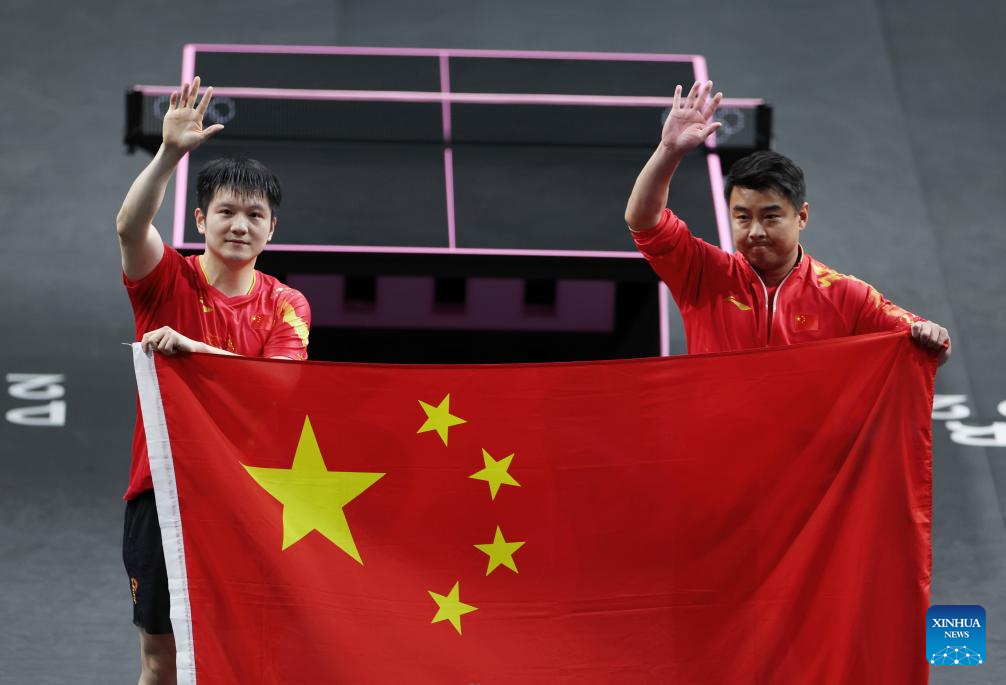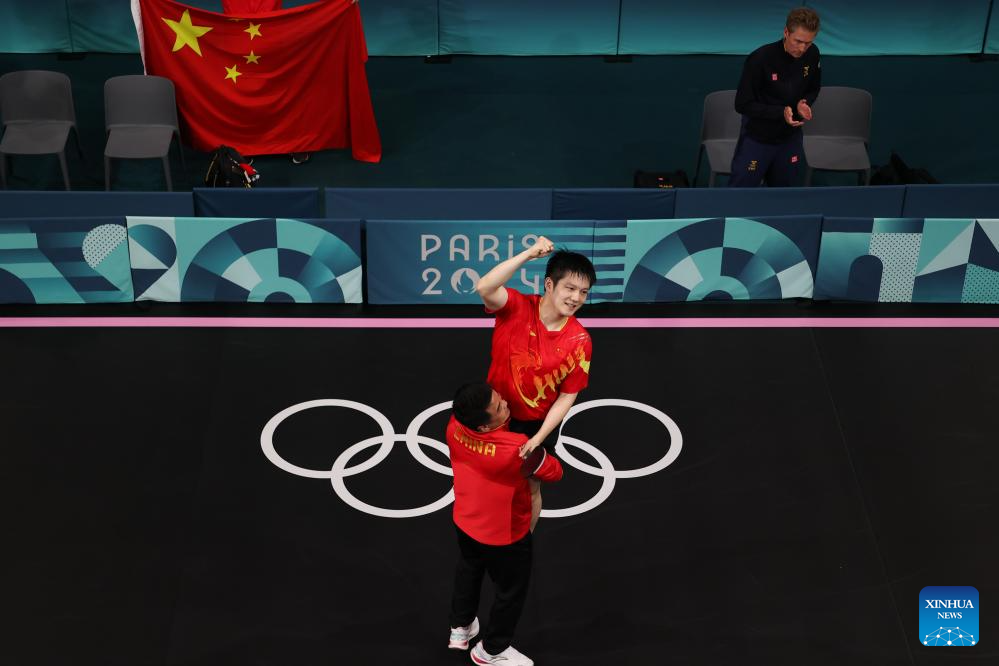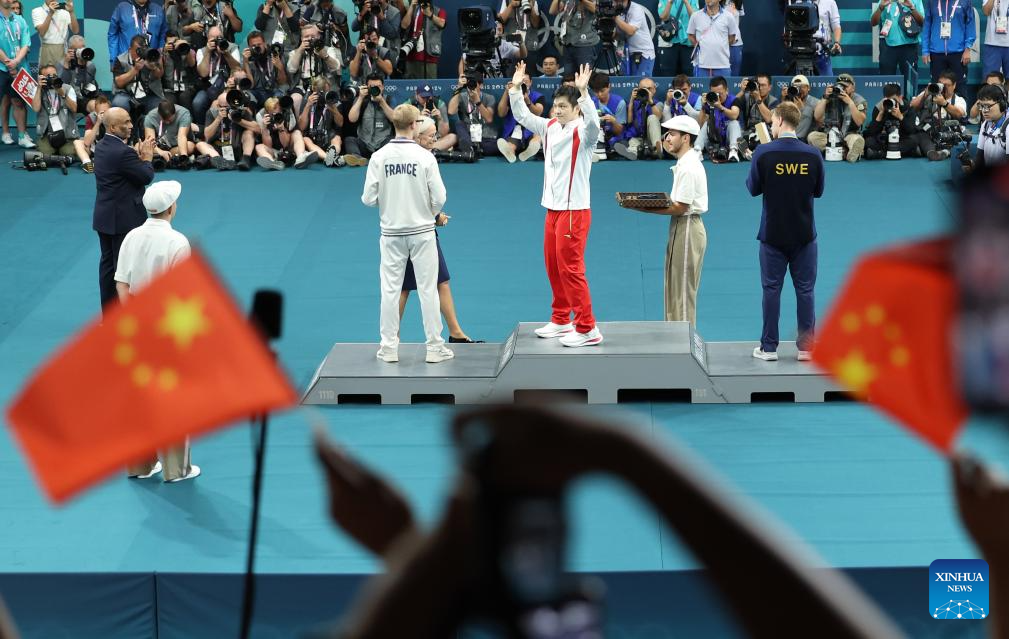
Fan Zhendong (L) of China celebrates with his coach Wang Hao after the men's singles gold medal match of table tennis between Truls Moregard of Sweden and Fan Zhendong of China at the Paris 2024 Olympic Games in Paris, France, on Aug. 4, 2024. (Xinhua/Liu Xu)
by Sportswriters He Leijing, Yue Ranran and Wang Yunjia
PARIS, Aug. 4 (Xinhua) -- A Chinese saying "Good schooling produces excellence beyond the masters" seems to have found its proof at the Paris Olympics, when China's Fan Zhendong defeated Sweden's Truls Moregardh 4-1 in the men's table tennis singles final.
The win not only secured China's third gold in the sport in Paris, but established Fan as the tenth Chinese player to achieve a Grand Slam, having won the World Championships, World Cup and Olympic titles.
When Fan converted on the sixth match point, roaring cheers echoed in the South Paris Arena. He then turned towards his coach Wang Hao and the spectators, crossing his arms in a cool pose, as if to tell the world: "I told you so."
Wang could hardly contain his excitement, leaping over the barriers to embrace his protege and plant a jubilant kiss on his head.
For the 40-year-old Wang, once dubbed "the eternal runner-up" because he won silver at three consecutive Olympic Games, this moment symbolized a breaking of his curse, albeit through his protege's resounding victory.
Fan faced the same sting after being defeated by compatriot Ma Long in the final three years ago at the Tokyo Games. Whispers circulated suggesting he should change a coach. Bearing the dual pressures, Fan didn't waver, relying on his mental fortitude and prowess to succeed.
"Without the lessons learned from Tokyo 2020, I probably wouldn't be here today. Every failure or challenge helps you grow. The prerequisite is that you have the courage to face your failure," Fan remarked.
In 2012, at just 15, Fan joined the Chinese national team, becoming the youngest member at that time. Off the court, he is known for his humility, but once in competition, his fierce attacks and solid techniques quickly made him a cornerstone of the national team.
Paris holds historical significance for Fan. At 16, he made his first World Championship appearance in the French capital. Five years later, he claimed his second World Cup singles title here. This year, his Olympic gold upheld China's supreme honor in table tennis.
World No. 1 Wang Chuqin suffered a shock exit in the round of 32 after losing to Moregardh, then the hopes of winning the title for China rested on the shoulders of Fan.
In the quarterfinals, he showcased his indomitable spirit and skills with a 4-3 comeback victory over Japan's Tomokazu Harimoto, earning him the nickname "The Great Wall of China" from Japanese media.
During Sunday's final, "The Great Wall" once again withstood Moregardh's attacks amidst the deafening cheers from Swedish fans.
Although Fan held a perfect record in his three previous meetings with Moregardh, the 22-year-old Swede, the first non-Chinese player who has reached the Olympic gold medal match since 2004, refused to be underestimated.
In the first set, Moregardh came out strong, delivering an 11-7 blow to Fan. Under coach Wang's tactical guidance, Fan adjusted his strategy in the second set, varying his rhythm and shots to outmaneuver his opponent, which eventually led to an 11-9 win despite Moregardh's tenacious returns.
Fan frequently found himself trailing at the start of sets but consistently rallied back with fast-paced, thrilling attacks that electrified the crowd. His confidence grew with each successful play. Even against Moregardh's tricky spins, Fan remained composed, winning the subsequent two sets with poise.
Coach Wang was a picture of intensity on the sidelines, his eyes fixed on the game, clapping fervently at every point Fan secured.
In the nerve-wracking fifth set, Chinese fans were on the edge of their seats after Fan earned seven gold medal points. But Moregardh saved one, then another, up to five, clawing back from 10-3 down to 10-8.
On his sixth gold medal point, Fan executed a brilliant backhand down the line, sealing the Olympic title and sending the arena into a frenzy.
On the first day of 2024, Fan posted his New Year's resolution on social media, hoping to "grow into a better version of himself."
"Any person's performance on court is the result of your hard work behind the scenes," Fan said after the game, acknowledging the immense effort behind his glory. He now sets his sights on the team event, aiming to contribute to a clean sweep of five golds for China at the Games.
In May, when the Chinese Table Tennis Association announced the Olympic roster, Fan simply left two words on social media: "Last dance."
Whether this edition will indeed be his Olympic final bow remains unknown, but what really matters, is that he is already on his journey to become a better version of himself. ■

Fan Zhendong (top) of China celebrates with his coach Wang Hao after the men's singles gold medal match of table tennis between Truls Moregard of Sweden and Fan Zhendong of China at the Paris 2024 Olympic Games in Paris, France, on Aug. 4, 2024. (Xinhua/Chen Yichen)

Gold medalist Fan Zhendong (C) of China, silver medalist Truls Moregard (R) of Sweden and bronze medalist Felix Lebrun of France attend the awarding ceremony after the men's singles gold medal match of table tennis at the Paris 2024 Olympic Games in Paris, France, on Aug. 4, 2024. (Xinhua/Liu Xu)



